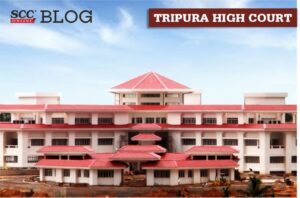Tripura High Court: T. Amarnath Goud, J. dismissed a second appeal which was filed under section 100 of the Civil Procedure Code, 1908 against the judgment which dismissed the appeal affirming the judgment passed by Civil Judge ( Senior Division) in connection with declaring the right, title & interest of the plaintiff over the suit land and recovery of possession of the suit land explaining the difference between burden of proof and onus of proof.
The Court at the time of admitting the appeal formulated the following question of laws:
1. Whether the allotment order issued by the Collector in favour of the respondent-plaintiff contraband sub-rule 7 of the Rule-15 of the Allotment Rules, 1962, as amended on 1982?
2. Any other substantial question of law shall be considered at the time of hearing?
The original plaint was filed by one Karibun Nessa wife of Rahamat Ullah in the Court of Civil Judge, against the defendant-appellant herein for declaration of her right, title and interest over the suit land described in the schedule of the plaint and for recovery of possession of the said land by evicting the defendant-appellant by removing all obstructions.
Counsel appearing for the appellant in support of his case has submitted that Courts committed wrong and illegalities in deciding both the suit and the first appeal. It was contended that the First Appellate Court ought to have considered that the learned trial Court did not properly appreciate the evidences both oral and documentary adduced by the parties and thereby ought to have allowed the first appeal setting aside the judgment and decree of recovery of possession passed by the trial Court.
The Court was of the view that in such a suit where the plaintiff / respondent has brought her suit for recovery of possession of the suit land based on title, it was for the plaintiff to prove her title and satisfy the Court that he she, in law, was entitled to dispossess the defendant from his possession over the suit property and for the possession to be restored with her.
The Court relying on A. Raghavamma v. Chencharamma, AIR 1964 SC 136 explained that there is an essential distinction between burden of proof and onus of proof; burden of proof lies upon a persons who has to prove the fact and which never shifts. Onus of proof shifts. Such a shifting of onus is a continuous process in the evaluation of evidence. In a suit for possession based on title once the plaintiff has been able to create a high degree of probability so as to shift the onus on the defendant it is for the defendant to discharge his onus and in the absence thereof the burden of proof lying on the plaintiff shall be held to have been discharged so as to amount to proof of the plaintiff's title.
The Court noticed that the plaintiff has discharged her burden of proving her title and previous possession over the suit land but the appellant-defendant failed to rebut the proof of title and previous possession of the plaintiff over the suit land. Thus, it can be said that the Trial Court was very much justified in passing the impugned judgment and decree declaring the rights, title and interest of the Plaintiff over the suit and recovery of possession of the same from the defendant as in the case the defendant had not claimed adversary possession.
Another question that came for consideration was that whether the suit of the plaintiff was barred by Section-188 of Tripura Land Revenue & Land Reforms Act,1960 and Section-9 of the CPC as alleged by the Counsel for the appellant-defendant.
The Court in this aspect noted that the plaintiff / respondent had brought her suit before the Trial Court praying for declaration of her rights, title and interest over the suit land and also for recovery of possession of the suit land ousting the defendant/Appellant and removing all sorts of construct there over with costs of the defendants and also granting all other relief (s) as deemed fit and proper and the costs of the litigation.
The Court minutely perused the record and scanned the evidence and taking into account both the legal as well as factual aspect of the case and finds no reason at all to interfere with the concurrent findings of the two Courts below.
The Court while dismissing the appeal found that the suit of the plaintiff / respondent has nothing to do with the settlement of land revenue, or preparation of records of rights or any entry thereof. Thus, it made clear that the suit of the plaintiff was not barred by Section 188 of the TLR & LR Act or by Section-9 of the CPC as contended by the Counsel for the Appellant / defendant. The claim of relief of the plaintiff can no way be entertained by the Revenue Court and the so called relief sought in the plaint can be granted only by the regular civil court.
It was observed that “It is not for this Court to decide the validity of the allotment of land by the Government in favour of the respondents in this second appeal. If there is any violation of conditions or attraction of disqualifications, it is for the appropriate authorities to look into the matter.”
[Akbor Ullah v. Rahamat Ullah, RSA. No. 06 of 2020, decided on 05-08-2022]
Advocates who appeared in this case :
D. Deb, Advocate, for the Appellant(s);
S. Lodh, Advocate, for the Respondent(s).
*Suchita Shukla, Editorial Assistant has reported this brief.

